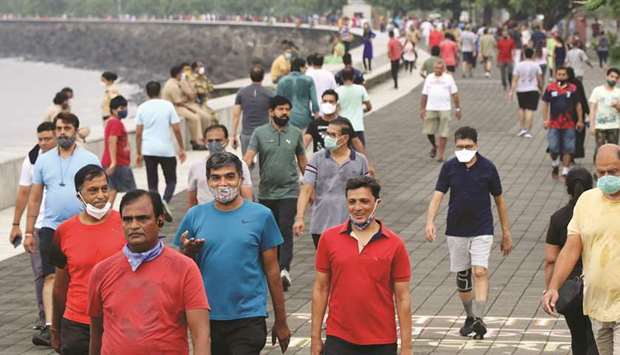India reported its lowest daily tally of coronavirus cases in almost a month yesterday as it prepares for clinical trials of a potential Russian vaccine in the next few weeks.
Federal health data showed 75,083 new cases in the last 24 hours, and 1,053 deaths over the same period.
There have been 5.6mn cases in total in the country, second only behind the United States.
The total death toll stands at 88,935 people.
Despite the fall in cases yesterday, India is consistently reporting the highest tally of daily cases anywhere in the world as a dense population and often rudimentary healthcare infrastructure hamper attempts to control the pandemic.
Yesterday drugmaker Dr Reddy’s Laboratories Ltd said it could begin late-stage trials of a vaccine within the next few weeks.
Indian trials of the Sputnik-V vaccine candidate, being developed by Russia’s sovereign wealth fund, will enroll 1,000-2,000 participants and be conducted at multiple government and private hospitals across the country, Deepak Sapra, CEO for API and pharmaceutical services at Dr Reddy’s, said.
“We want to get to the first step – which is the commencement of the clinical trials by getting the necessary approvals from the Indian regulators – within the next few weeks,” Sapra said.
Also yesterday, an official said Punjab’s three government medical colleges will participate in Phase-3 trials of Bharat Biotech Ltd’s Covaxin, the first indigenously-developed vaccine candidate against the coronavirus, in collaboration with the Indian Council of Medical Research (ICMR).
The trials are set to start on October 15.
Bharat Biotech has announced Rs7.5mn insurance for the participants in case of adverse effects or death.
The possible side effects of the vaccine could include fever, pain at the site of the intramuscular injection and malaise.
Two doses of the inactivated virus injection would be given to the participants (0 and 28 days) as part of the Phase-3 human trials.
Meanwhile, the ICMR said the efficacy of the Covid-19 vaccine in India is likely to remain between 50 to 100%.
“We are aiming for 100% efficacy but may land between 50 to 100%. However, it still would be an effective vaccine against the virus,” ICMR Director General Dr Balram Bhargava said.
Bhargava added that as per the World Health Organisation (WHO), a vaccine having above 50% efficacy is acceptable for administration.
“Hundred percent efficacy is not achieved in vaccines for respiratory viruses,” he said.
The Drugs Controller General of India released draft guidelines for Covid-19 vaccine on Monday. The 39-page document lists several safety protocols that companies have to follow, including developing adaptive trial designs.
As per the guidelines, the vaccine that will go for approval must elicit superior immune responses compared to no vaccination against Covid-19. An individual who gets the vaccine should be protected from re-infection for at least a year.
Besides, the regulatory approval for the vaccines will come through only if companies demonstrate 50% efficacy in the primary endpoint or more than 30% efficacy in the secondary endpoints. This means a vaccine has to either prevent or decrease the severity of the disease in at least 50% of people vaccinated.
The regulatory body also clarified in the guidelines that persons who have been infected with the Sars CoV-2 virus in the past should be included in vaccine testing, as long as they do not have acute Covid-19 or other acute infectious illnesses.

People stroll along the promenade at Marine Drive in Mumbai yesterday. India with 5.6mn cases reported 75,083 new infections in the last 24 hours, and 1,053 deaths over the same period. Maharashtra continues to be the worst-hit state followed by Andhra Pradesh, Tamil Nadu, Karnataka and Uttar Pradesh.
